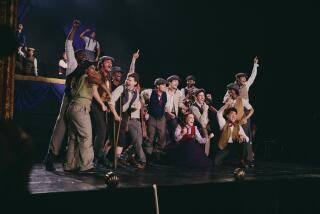Poetry of protest echoes in the air
- Share via
NEW YORK — Thursday night, while the Republican National Convention built up to its climax and President Bush’s speech, those in the opposition here had several choices besides sitting at home depressed.
They could go to a vigil in Union Square and shop; with the convention and protests over, T-shirts and buttons were cut-rate. Or they could head over to St. Mark’s Church, which had been a headquarters for protesters all week.
Long welcoming to poets, it had hosted a rousing poetry reading the night before. Though not air-conditioned and so sweltering that few could stand it for long, the former house of worship was packed for the event. Scores of people lined up outside, waiting for space to sit or stand and sweat.
Hope, Wednesday night, was in the hot, humid air. Judith Malina, a founder of the Living Theatre in 1947, told the crowd that she had lately been working in Europe because she could no longer count on support in the U.S. But now she was ready to return to New York, and among her reasons were “because knuckleheads are giving anarchists a bad name,” “because the revolution is not a movie shown in 1968” and “because the angels are tired of L.A.”
Thursday night, however, the mood at the church was very different. Outside, a rock band blasted as a party tried vainly to get off the ground. Inside, a few dozen people sprawled on the floor evincing quiet desperation and watching the president’s speech on a small television set.
Voting is hip
What might have energized the sprawlers was a good jolt from the nearby Bowery Poetry Club, where the regular Thursday night poetry slam had an anti-Bush theme. The place was packed, and the poets, mostly hip-hop, were exhilarating. Well-equipped to rage against the machine though they were, they also used their emotional language and adrenaline-fueled beat to present compelling reasons for getting out the vote in November.
The BPC -- which offers inexpensive, homemade food and has a good bar -- served as an unofficial hospitality suite for the extensive, amorphous protest arts festival that had been going on around New York all week. It offered its stage as a place for poets to vent, it provided a center for discussion by listeners, and it took as its mission the inspiring of community involvement.
It ministered to the soul as well. Each morning at 5, there was “Regime Change Yoga With Yogi Libby Tonorezos.”
Clarinet vs. copter
Another place for finding sympathetic community on a night when protesters and artists were beginning to feel that their voices were not being heard over the Republican media roar was Washington Square Church, the venue for a performance collage of music, ritual drama and spoken word called “The Republic in Ruins.” Nation magazine columnists Jonathan Schell and Patricia J. Williams spoke. The Collateral Damage Ensemble mimed depressing scenes of war and destruction.
There was excellent music. Derek Bermel, one of New York’s rising young composers, was represented by his vividly expressive, wailing clarinet trio, “Resignation to Alarm.” And Eugene Drucker, a violinist in the Emerson String Quartet, played Bach’s Chaconne in D minor.
Throughout Drucker’s performance, a helicopter loudly circled above (as choppers had all week), but the violinist, in white T-shirt and linen pants, continued unfazed, playing with quiet, dignified concentration and an inspiringly clear, pure intonation. This was great music meant to stir the soul, and nothing -- not politicians, not protesters, not the police -- could stop it.
That is not to say that New Yorkers can’t still be irreverent. After the Bach, a mother who said she had opposed the war from the beginning but whose son is a soldier in Iraq made a plea that U.S. troops be brought home. A salty woman sitting behind me loudly asked no one in particular, “So, why’d he go?”
More to Read
Get the L.A. Times Politics newsletter
Deeply reported insights into legislation, politics and policy from Sacramento, Washington and beyond. In your inbox twice per week.
You may occasionally receive promotional content from the Los Angeles Times.











